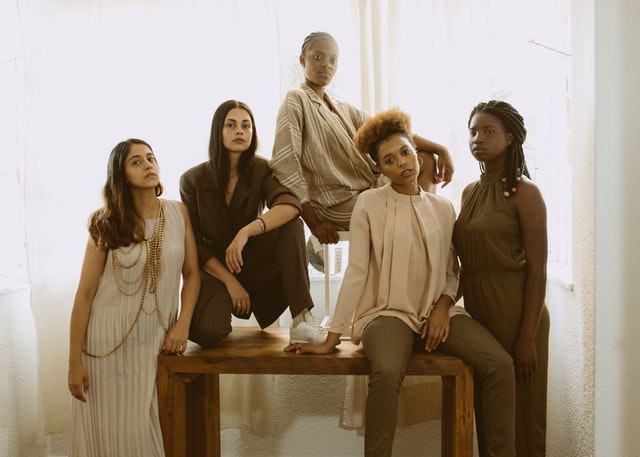I decided the time was right for me to become a mom when I was twenty-nine, except I was not going to become a mom the conventional way. I was single and had been for most of my life. I was doing well in my career. I travelled the world quite a bit; in fact, that was one of my favourite things to do. Perhaps, however, most unconventional of all, given where I was in life, was that I decided I was going to adopt.

My dream has always been to adopt. However, I thought that I would be going through the process later in life, as many people who make this decision do. It was going to be at the point where I had a husband, a house, and a dog. In essence, I was planning to go the route of adoption in what perhaps seemed the more traditional way. Why was this? Well, as much as I had a desire to adopt, I will be the first to admit that I was strongly conditioned by so-called chick flicks. In those films—I started watching Disney princesses and then moved on to romantic comedies (rom-coms)—a single, usually quite desperate woman, whose life is chaotic, meets the man of her dreams and all the pieces fall into place. Then, even if the relationship does not work out right from the start, they find a way, and, in the end, they live happily ever after. In my mind, I extended the scene further, as I always knew that a big part of my happily ever after would be the bit beyond the film where they have children. So I waited and waited, sometimes impatiently, for my own Prince Charming to ride to me through the sunset and for my own happily ever after to begin.
But it didn’t—at least not like I thought it was supposed to. In fact, it was far from what was in the films. I had a wonderful group of friends, a very supportive and loving family, and a great education and, as noted, I was travelling the world. In most respects, I had what from the outside was a wonderful and privileged life. Yet I was only able to dwell on one thing: my constant singleness. As I got older, it got so bad that it manifested itself in the form of clinical depression—I have no qualms in admitting this. I hated myself because I could not work out what was wrong with me, why no one could love me. I spent long days and nights trying to figure out how I could change myself so that someone would finally be able to love me. It did not help that I was emotionally bullied when I was a teenager in school, being often called “a loser.” The more it did not happen, the worse it got, and, finally, the only logical conclusion I could come to was that those bullies in high school were right: I was indeed a loser.
In the meantime, friends around me were having their own happily ever after, and I gallivanted around the world to their beautiful weddings. I was genuinely very happy for them. But with each wedding, I was wondering when it would finally be my turn. People kept saying to me, “Don’t worry. I am sure it will happen for you” or “It will happen when you least expect it.” The problem was that I could not “least expect it” anymore; it was front and centre to my life, and I became convinced that all I needed to find eternal happiness was a man.
After many of years of suffering and my condition worsening, I decided it was time to get help. I am a perfectionist, and it takes a lot for me to ask for help. Particularly in this case because I truly believed that there was nothing clinically wrong with me; no one could help someone not be a loser. Finally, and thankfully, through cajoling from some lovely friends and family who cared deeply for me, I found a wonderful psychologist who helped me think and see outside the proverbial hole I had dug myself. I also started reading again, which is one of my favourite pastimes but something I had not kept up with during the height of my depression. Reading was very important, as it helped me gain some perspective outside the rom-coms I tortured myself with when I was depressed.
After years of working on myself, I was finally able to once again clear the fog and engage in self-reflection. I realized that there was no one else responsible for my happiness but myself. Although this may sound very simple, it was perhaps one of the most difficult realizations I had to come to in life. This was also the time I decided that I was a feminist because I did not need to conform to societal norms of women to find my happiness. I was not only a feminist but a proud feminist, who had to take care of myself and my own internal happiness. The realization that trying to achieve conformity had harmed me was deeply shocking. Being able to finally embrace my feminist identity supported me in other parts of my life too, particularly in my career. Once I had managed this step, I was finally able to pursue my own happily ever after. I decided to try and dissect what my dreams and aspirations were so that I could start putting them into action.
From this, I realized that although I had dwelled on the fact that my happily ever after was marriage, my dream was actually to have children. Thinking through this, I realized that I had always associated having children with finding the perfect man, building the perfect house, and having the perfect life. I finally recognized that I did not actually know what “perfect” meant in this sense; rather, I had to discover what perfect was for myself. Therefore, I went ahead and put my own dreams into action and became a mom.
The Journey: Realizing My Dream
When I decided to go down the path of adoption, I had braced myself for many things: immense bureaucracy, long waits, as well as the toughness of being a single parent. The one thing I did not expect, which was possibly the toughest part of the whole process, was how openly judgmental people were about my decision to adopt as a young, single mother. Today, as I sit here and write this piece with my most special, wonderful baby daughter napping in the background, I am forever grateful that I did not listen to them. Rather, I am deeply fulfilled with the journey of adoption because it has made me a much stronger woman and better feminist parent to my daughter.
In order to understand my journey, it is important to illuminate some of the judgments I have experienced. In hindsight, it would have been very helpful to know more about the ways that society thinks about a single woman adopting a child and to have been able to prepare myself for what was coming my way rather than, perhaps ignorantly, assuming that everyone would be happy with my decision. None of the parenting books or adoption books I read mentioned this challenge. To support other women who may make a similar decision in the future, I share a set of responses I perhaps should have given at the time:
Comment: Have you really thought it through? Are you sure you are old enough to make that decision? Why don’t you wait a few years until the perfect man comes along?
What my response should have been: Actually, now that you mention it, after having been old enough to vote for more than ten years; after having lived, studied, and worked in eight different countries on three continents; after having been financially stable and independent since university; after having decided to go perhaps the most difficult route to have a child, with my life and future parenting skills being mercilessly critiqued by the government and social workers; and after having to wait more than two years, to have my child—maybe you are right, and I have not thought my decision through.
Not only did I put pressure on myself to conform to the idea that I needed to marry before having children, society also pressured me to conform as well. Society expects women to have children, yet society, at the same time, restricts how it can be done. Aside from not understanding why I chose to become a mother as a single woman, people found my decision to adopt even more controversial. I was told a number of times that even in-vitro fertilization from a sperm donor was more acceptable than adoption.
Comment: Now you are just advertising your infertility.
What my response should have been: Really? That is news to me.
This comment was perhaps one of the most culturally centred comments I received. In Uganda, producing children is a sign of a woman’s status. In fact, the verb “to produce” is actually used when it comes to children. When a woman has twins, for example, her worth, in terms of her dowry, increases as she is perceived to be more fertile. In Uganda, we have some of the highest fertility rates in the world. However, due to high costs of raising children, a large number of children in Uganda are placed in orphanages to receive care; others are abandoned.
Even with this mandate and expectation of women having many children in Uganda, adoption is still seen as a last resort for those women are ostensibly unable to produce. That I was choosing adoption at a young age was seen by people as giving up on having children of my own. I do not know whether I will have biological children or not. In the future, if the right partner comes along, then I may, only if to experience the feeling of pregnancy and birth. But I may also just choose to adopt again.
Comment: You know, now you will never get married.
What my response should have been: Oh thank goodness.
When I mentioned my astonishment about how many people have criticized my decision to adopt, I am told, “I am sure that’s just a cultural thing.” It was not. Such comments came from all kinds of people from different backgrounds, men and women alike. Given my background, it is perhaps the one that, at first, pushed my sensitive buttons the most.
However, I believe that these comments and experiences have better prepared me if I should choose to partner someday. If a man does not respect me as a single mother by adoption, then I know they are not the right person for me. It took this journey of self-realization and becoming a parent to understand that protecting my daughter’s and my own preciousness is worth more than any partner in the world to me. As much as I may still want to marry and for my daughter to have a father, if a prospective partner does enter our lives, but he does not bring joy to our lives, then he is not worth it and we will do just fine by ourselves.
Comment: But your career is going so well, why don’t you wait for a bit. This may not be good for it.
What my response should have been: Oh does that mean you think that my career is going to go less well in the future?
I am sure that this is a comment that not only single mothers get but all women who are considering having children in general. Long before I pursued my path of parenthood, I received an important piece of advice from a woman I respect greatly. She is quite a bit older than me and ended up not having children, not because she did not want to but because she was always waiting for the perfect time. She decided to wait for that elusive optimal time to come along, putting her career first. In the end, she woke up one day and found that she was too old to fulfil her dream of having children. She advised me, therefore, that there is no ideal time in your life; instead, you make it ideal by resetting your priorities and working around it.
At the time I started my adoption process, my career was indeed going well. I had finally found my passion workwise. In the two years that I waited for my daughter’s arrival, my career only got better. On top of it all, unlike pregnancy, where you have approximately nine months’ notice for your baby’s arrival, with adoption you are unsure when the call will come that will change your life forever. For me, the call came after I had just come back from a two-week trip to Myanmar and the U.S. and I was home for a break before I would be travelling again in the following weeks.
Before my baby came along, I worked insane hours as I only had to focus on myself and my career. However, I realized that it was not wholly fulfilling to me. I have only been a mother for a short while at the time of writing this, so there is still a lot for me to discover. I will say that I was absolutely terrified of being a parent, being a single parent, and of being solely responsible for a little life. Many people told me that I was in for a difficult ride as a single parent. Some made it seem that it would be near impossible. When my daughter entered my life, I braced myself for beautiful but difficult times. However, what I have discovered is that mothering comes naturally to me. My instincts are there to help and to guide me. And with family and friends surrounding me, I am never doing it alone. I know that things will change, particularly when I return to work, and I realize motherhood will mean letting go of some of my commitments. Nonetheless, I feel my life has become so much more fulfilling. Becoming a mother has made me a more rounded person. I also believe that if my career was going well before my daughter, there should be no reason why it should not continue this way, particularly because I am a far happier person than I was before. I fully recognize the challenges I will face as a single and employed mother. However, I now know I have the strength to face these challenges.
The Future: Our Long Path Ahead, Together
My path has not only gifted me with an amazing daughter, it has also made me a strong feminist parent. With this, I am confident I am now able to give my daughter a more robust foundation in life based on the lessons I have learned; this includes how to have a healthy sense of self as well as how to openly and assertively reject insensitive and judgmental remarks. Moving forwards, I want to live our life together drawing upon suggestions from the feminist manifesto I live by—namely Dear Ijeawele, or A Feminist Manifesto in Fifteen Suggestions by Chimamanda Ngozi Adichie. The final section of this paper, therefore, is a set of solemn promises to my daughter on how we will pursue this together.
1. “Teach her (that) the idea of ‘gender roles’ is absolute nons-ense.” (Adichie 15)
Red was always my favourite colour. I also like bright yellow, orange, blue, and green. Although I will also sometimes wear pink, it is not something I am immediately drawn to. Therefore, less to break gender stereotypes and more to dress my daughter in colours I like, I went out to find her clothes in those colours. I was genuinely astounded that in 2018, this is still a difficult undertaking. Most of the shops are organized in two sections: one in blue for the boys and the other in pink for the girls. To challenge gendered clothing, I bought my daughter clothes from both sections. This was my first and hard lesson on how to overcome these predefined norms.
Most challenges still await me, as my daughter is still only a few months old; she is more interested in staring at my multicoloured bedcovers than any particular piece of clothing. However, I have already begun to prepare for the future. For example, I have ensured that my daughter will have a wide array of toys and books, particularly ones about notable women— Favilli and Cavallo’s Good Night Stories for Rebel Girls being my current favourite. I believe that in our home life, together, we will be able to achieve this. The major question for me is how this will develop once she enters playgroups, kindergarten, and school. It is not that I don’t want my daughter to be a so-called girly girl. I just want her to be able to choose that rather than have society choose for her.
2. “Beware of the danger of what I call Feminism Lite…. Being a feminist is like being pregnant. You either are or you are not. You either believe in full equality of men and women or you do not.” (Adichie 20)
Being a mom is pretty much equivalent to being a teacher. It is also means becoming a student again. Each child, even as an infant, is different. Everyone’s situation is different. Therefore, I continue to learn from my daughter every day about her needs and my own, too. One thing that becoming a mother has taught me is that being a feminist is not a label one can just carry sometimes. It is true that women are progressing in the world, but we are still far from reaching anything close to gender parity. The reason why, in the past, I did not want to be labelled a feminist was because the term carried some negative connotations. I used to believe there were much more important things to strive for in the world. However, now I know that if I am not a true feminist and do not aspire to full feminist values, then none of the other dreams and aspirations I have for my daughter will happen. Therefore, by being a proud feminist parent, I want to build these foundations for her. One of the major lessons I want to pass on to her is that there is no such thing as feminism lite; rather, I want her, unlike me, to grow up and fight for her rights and equality right from the start.
3. “Never speak of marriage as an achievement.” (Adichie 30)
A major mistake I have made in my life that I want my daughter to avoid is to assume that happiness can only be found in marriage. She has taught me that you can pursue your dreams as an individual and find happiness through self-love and care. Even today, I am told the more determined and independent I become, the less likely it will be I will ever get married. However, if I had not become the strong, independent feminist I am today, then I might never have pursued my dreams and ambitions and I would not be with my daughter. I would have also likely failed at finding happiness because right now, since becoming a mom, I have felt the happiest and the most content I have ever been. Therefore, my success in parenting will be evident if I can raise a daughter who has the ability to think for herself and who does not worry about what others think. If I am able to do this, then I am sure she will not see marriage as women’s only potential achievement but rather as merely another option for her if she wishes.
4. “Teach her to reject likeability. Her job is not to make herself likeable, her job is to be her full self, a self that is honest and aware of the equal humanity of other people.” (Adichie 36)
Until reading Dear Ijeawele, I had never really reflected on this part of my self. It was one of those illuminating moments that provided deep insight into myself. I have tried to make myself likeable. I would back down from something I truly believed in if I felt that it would make me less popular. I felt I failed if someone decided they did not like me or a decision I took. This quality, I now see, is one that we consciously or subconsciously pass on to most girls, no matter the negative affect on their self-esteem.
I am just learning for myself that likeability is not an achievement in itself. If there is something I truly believe, I realize that I must pursue it, even if someone does not like me for doing so. Although it took me a long time to get here, I know that in raising my daughter, I will not require her to be likeable just to please others.
Drawing upon inspiration from Adichie, I decided that I wanted to immortalize my own promises to my daughter in a letter. Therefore, between receiving the phone call that she had arrived and the day she came home, I wrote her a letter to honour the fact that she made my dreams come true and to enshrine my dreams for her. This is part of the letter I wrote:
To the most special daughter in the world,
After nearly two years of working to put my dreams of becoming a Mama into action, the time has finally come for you to come home and for us to be the family we were always meant to be. I thank you from the bottom of my heart for making my dreams come true in ways more beautiful and special than I could have ever imagined.
Today is the day, therefore, I pass the magic wand to you, the most special girl, and promise you from the bottom of my heart that my life will now be dedicated to providing you with the foundations for you to transform your dreams into plans and your can’ts into cans.
This is the start of our happily ever after.
With all my love forever and more,
Your Mama
“Make Difference Ordinary. Make Difference Normal.” (Adichie 59)
The reason I wrote this piece is that I did not find any comfort in the parenting books I picked up to prepare for my daughter’s arrival. Quite the contrary in fact—they were terrible and instilled the fear in me that nothing I do would make me a good mother. Coupled with these parenting books, new mothers also receive far too much unsolicited advice and criticism. Therefore, what I hope to contribute to the discussion is that we all do the best we can, given our circumstance. We must realize that everyone’s conditions are different; each parent is different, and, above all, each child is different. You can become a mother and a family in a multitude of ways. And all mothers adapt and draw upon their experiences to build the best foundation they can for their child. The journey I went through in becoming a mother has taught me to embrace all differences as a positive, which are what make individual journeys so special.



